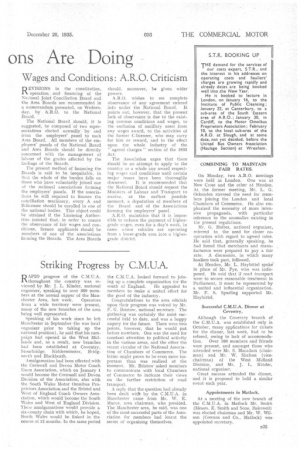Striking Progress by C.M.U.A.
Page 35

If you've noticed an error in this article please click here to report it so we can fix it.
RAPLD progress of the C.M.U.A. throughout the country was reviewed by Mr. J. L. Kinder, national organizer, speaking to over 350 members at the annual supper of the Man
chester Area, last week. Operators from a wide territory were present, many of the new branches of the area being well represented.
Speaking of his work since he left Manchester in September -(he was local organizer prior to taking up the national position), he said that his campaign had opened in the West Midlands and, as a result, new branches bad been established at Coventry, Stourbridge, Kidderminster, Bridgnorth and Blackheath.
Amalgamation had been effected with the Cornwall and Devon Motor Coach Users Association, which on January I would become the Comnrall and Devon Division of the Association, also with the South Wales Motor Omnibits Proprietors Association and the Bristol and West of England Coach Owners Association, which would become the South Wales and West of England Division. These amalgamations would provide a. six-county chain with which, he hoped, North.Wales would be -linked in: the course of 12 months.In the same period the C.M.U.A. looked forward to joining up a complete organization for the south of England. He appealed to members to make a united effort for the good of the industry.
Congratulations to the area officials upon their progress was voiced by Mr. F. G. Bristow, national secretary. The gathering was certainly the most successful held to date, and was a happy augury for the future. There were two points, however, that he would put before members. One was the need for constant attention to political activity in the various areas, and the other the recent circular of the National Association of Chambers of Commerce, The latter might prove to be even more important than was realized at the moment. Mr. Bristow 'asked members to communicate with local Chambers of Commerce to indicate their views on the further restriction of road transport.
A reply that the question had already been dealt wits' by the C.M.U.A. in Manchester came from Mr. W. • E. Macve, area chairman, who presided. The Manchester area, he said, was one of the most successful parts of the Association for members had learnt the secret of organizing themselves.




















































































